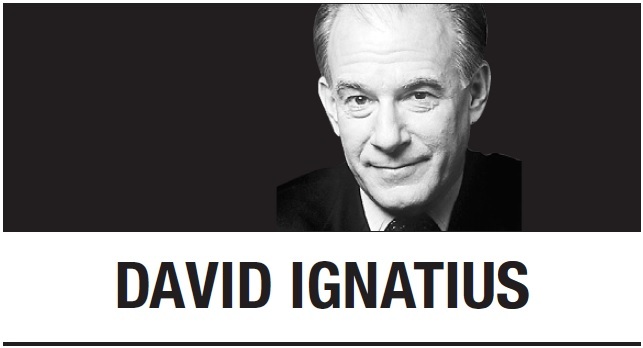[David Ignatius] US, Russia want to contain China

The Donald Trump administration sent a characteristic mixed message on arms control: It announced a plan to quit the “Open Skies” agreement with Russia, even as it proclaimed its eagerness for a wider arms-control process that would include both Russia and China.
Many analysts focused on the treaty withdrawal as a sign of worsening relations with Russia, but I think there’s something more complex at work, and more hopeful for US-Russia relations. At a time of increasing rhetorical confrontation with China, the US is expanding its engagement with Moscow on arms control, humanitarian assistance to Russia for COVID-19 and other issues of mutual concern.
As always with the Trump administration, to be sure, there are conflicting voices internally. Some officials dislike arms control and would like to sever all agreements that limit US options. But there’s a camp that has always favored more engagement with Moscow, led by Trump himself, and I suspect they are driving policy. Administration officials don’t say it explicitly, but my guess is that the net effect of the administration’s actions is a tactical tilt toward Russia.
For a half-century, strategic negotiations have been a three-way balancing act involving Washington, Moscow and Beijing. President Richard Nixon’s opening to China in 1972 was partly an effort to gain leverage in bargaining with the Soviet Union. Similarly, the Trump administration’s new outreach to Russia may be prompted by fears of a rising China.
Global power dynamics are shifting. A decade ago, China was seen as a country that sought only a limited nuclear deterrent, much like Britain or France. That’s no longer the case, US officials believe. China is now bidding for nuclear parity -- and Russia may share the US interest in checking Beijing’s growing power.
Secretary of State Mike Pompeo said Thursday the administration intends to withdraw from the Open Skies Treaty, a 1992 agreement that allows the 34 signatories to overfly each other’s countries. The US claims Russia has been violating the pact, and Pompeo said the US might “reconsider our withdrawal” if Russia observes the agreement.
The administration’s broader strategy was outlined later Thursday by Marshall Billingslea, the State Department’s new special envoy for arms control. He said in a speech at the Hudson Institute that he plans to meet as soon as possible with Sergey Ryabkov, the Russian deputy foreign minister, to discuss a range of arms control issues, including possible extension or expansion of the New START treaty, which will lapse next year.
Billingslea said he thinks Ryabkov shares the US view that China should be part of future agreements to limit nuclear weapons, and he quoted a public statement by the Russian official: “Making nuclear disarmament a multilateral process is becoming a priority.” Billingslea left open the possibility that the New START treaty with Russia might be extended, temporarily or for another full five-year term, while China is brought into the negotiation process.
The planned arms control discussions come against a backdrop of wider efforts at cooperation.
The most visible outreach effort is humanitarian assistance to Russia as it copes with a severe COVID-19 outbreak that now totals nearly 320,000 cases, second only to the caseload in the US. The Trump administration said it plans to send 200 ventilators as emergency assistance to Russia.
It’s a measure of how contentious Russia is in American politics that even this emergency medical assistance is controversial. House Speaker Nancy Pelosi blasted the administration for donating the ventilators, arguing that Russia “can very well afford to pay.”
That was rhetorical overkill by Pelosi. America needs more outreach in this global crisis, not less. And the pandemic is a useful moment for all countries to recognize common interests, even in the shadow of the Kremlin’s covert meddling.
US and Russian officials have been setting the table in recent weeks for more serious talks. Trump and President Vladimir Putin discussed areas of possible cooperation last week in an unpublicized phone call. That followed a May 6 phone call between Secretary of State Mike Pompeo and Russian Foreign Minister Sergey Lavrov, who discussed “next steps on arms control” and issues of “mutual concern.”
Arms control is now a three-way street. As Billingslea explained, “We recognize that, increasingly, we have a trilateral nuclear competition. ... We believe arms control has the potential to limit that competition. We will try.”
The effort makes sense. But three is an inherently volatile number. As Herman Kahn, the godfather of nuclear strategy, observed decades ago: A bipolar world is stable, and a multipolar world can eventually be stable. But the transition between the two is risky.
David Ignatius
Contact David Ignatius on Twitter @IgnatiusPost -- Ed.
(Washington Post Writers Group)